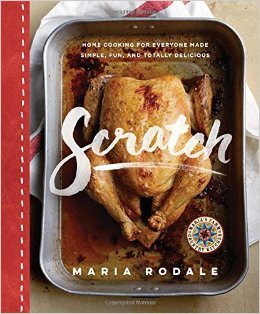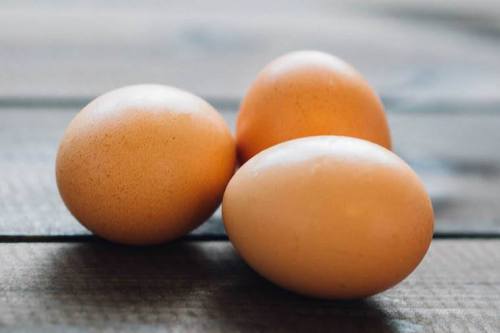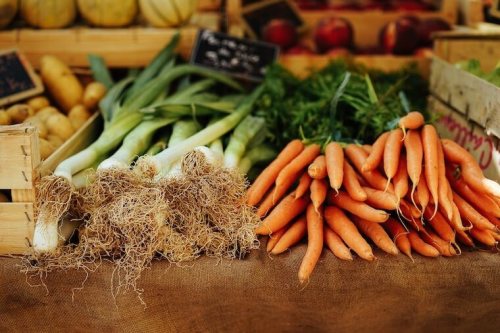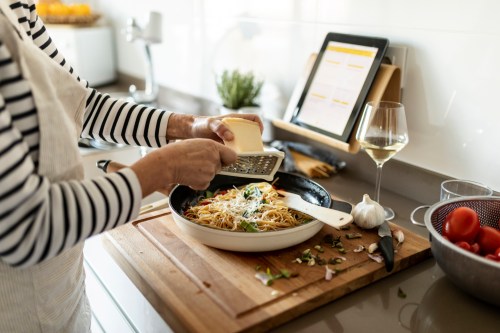The 5 ingredients you should always have in your kitchen
If you're a newbie in the kitchen, these are the 5 staples you need to start cooking healthy meals from scratch, according to Maria Rodale.

Whether you don’t get home from work until 9 p.m. or have a kitchen the size of a shoe box (just me?), it’s easy to find a reason not to cook (especially when there are healthy to-go spots on seemingly every corner in major cities). But if your fridge only contains takeout leftovers, you’re missing out: Cooking at home means healthier meals that often taste better than your latest Seamless order—and it doesn’t have to be complicated.

“Everybody is busy and confused as to what the ‘right’ thing to eat is,” says Maria Rodale, CEO of health-conscious publishing company Rodale Inc. and author of Scratch: Home Cooking for Everyone Made Simple, Fun, and Totally Delicious. For Rodale, home-cooked dishes are the central element of a happy, healthy life. “Simple, fresh meals that come straight from the stovetop to your plate are true nourishment,” she adds. “It’s the kind of food that makes everything a lot more meaningful.”
And no, it doesn’t have to be an all-day endeavor. “As a busy working mom wanting to eat organic food and good food, I learned that the best way is to do it yourself in a quick and easy way,” Rodale says.
The secret? If you’re new to the kitchen, all you need is a handful of wholesome ingredients to get you started.
Keep reading for Rodale’s five kitchen staples everyone needs to get you cooking from scratch.

1. Eggs
“Eggs are nature’s perfect food,” raves Rodale, who is a firm believer in using the whole egg. “There’s a fundamental magic and balance in the egg that we’ll never understand.” If you’re just getting comfortable in the kitchen, eggs are an ideal starting place because of their versatility and simplicity—when in doubt, put a poached one atop a bed of greens or your avo-toast.

2. Extra-virgin olive oil
A bottle of extra-virgin olive oil comes in handy whether you’re making salad dressing, sautéing veggies, marinating chicken or fish, or drizzling a bit on top of a bowl of soup. Rodale’s response to fears of (healthy) fats? “I don’t believe in demonizing anything that comes directly from nature.” Your brain and your body, which need fat to function, will thank you.

3. Fruit and vegetables
Keep fresh fruit on hand to add on top of oatmeal, toss into a smoothie, or nibble on when in need of a snack. A crisper full of veggies equals endless roasted, steamed, grilled, and raw possibilities. When the produce is fresh, you don’t need to do anything fancy in the kitchen to make it taste good—but if you don’t live in a sunny locale, frozen options are just as healthy.

4. Organic meat
Rodale is a big fan of organic chicken, arguably the most versatile of all the animal proteins. Bake a simple chicken breast and you’ve got a week’s worth of interesting (and easy!) meals: fajitas, salads, stir fries, pasta dishes…the possibilities are endless. Just be sure to look for the certified organic label, and buy locally whenever possible.

5. Salt
“Salt brings out the flavor in food,” explains Rodale of the mineral you’ve probably already got on your kitchen table. And while it’s worth paying attention to sodium levels when you’re buying processed, packaged foods, your body needs salt for fluid retention as well as muscle and nerve function. If you’re just getting your sea (er, kitchen) legs, don’t worry about stocking your spice cabinet just yet—you’d be surprised how far a pinch of salt will take you.
Once you stock up on these five, you might be ready to up your at-home cooking game—these are the under-the-radar foods that are blowing up at Whole Foods right now. Or stock up on these superfoods that are actually worth splurging on.
Sign Up for Our Daily Newsletter
Get all the latest in wellness, trends, food, fitness, beauty, and more delivered right to your inbox.
Got it, you've been added to our email list.










